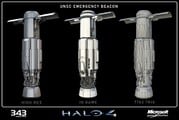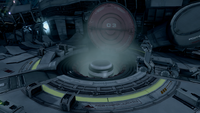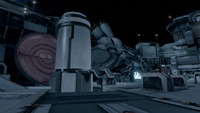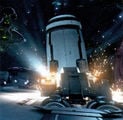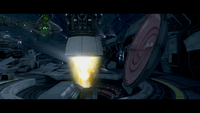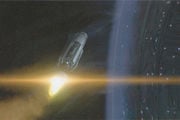M4093 Hyperion nuclear delivery system
From Halopedia, the Halo wiki
| M4093 Hyperion nuclear delivery system | |
|---|---|
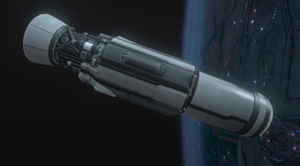
| |
| Production overview | |
|
Manufacturer: |
|
|
Type: |
|
| Specifications | |
|
Length: |
61.8 meters (202.6 ft)[1] |
|
Width: |
15.8 meters (51.9 ft)[1] |
|
Height: |
17.1 meters (56.1 ft)[1] |
|
Filler: |
1.9 metric tons (1.9 LT; 2.1 ST) Aeluphos-DTPF 9025[1] |
|
Guidance system: |
Computer guided |
| Service history | |
|
In service: |
|
- "That cruiser's shields are down! Assuming they don't raise them, that missile's going to be one heck of a surprise."
- — Cortana[2]
The M4093 Hyperion nuclear delivery system is a nuclear weapon developed by Acheron Security.[3][4]
Overview[edit]
Design details[edit]
The Hyperion is one of the largest missiles used by human starships, and serves as a weapon for attacking targets of strategic significance,[5] and for anti-ship space warfare.[1] Their massive size puts them at a length longer than many slipspace-capable starships such as the Vancouver-class courier. At the base of the rocket is a multi-staged booster, connected to the main body via a release port that can allow the weapon's booster sections to be detached once spent. The main body of the weapon contains a supplemental fuel line to the engine. When launched, the missile relies on an external accelerator (such as a silo) for initial launch, with the missile's own internal rocket systems activating once in flight.[1]
The Hyperion rocket serves as a delivery system for a massive nuclear weapon. The warhead contains 1.9 metric tons (1.9 LT; 2.1 ST) of Aeluphos Deuterium-Tritium Pure Fusion (DTPF)-9025,[6] allowing for the creation of a nuclear fusion reaction upon delivery at a target.[1] This reaction is capable of completely destroying an unshielded Zanar-pattern light cruiser.[2] It takes several minutes to prepare, load, and fire each missile, meaning that they are not easily used for rapid response.[5]
Usage[edit]
Hyperion missiles are widely used on the frigates and destroyers of the UNSC Navy.[1]
- Frigates
- Strident-class heavy frigate - 1x Hyperion silo, containing three individual missiles.[5][4]
- Charon-class light frigate - 3x Hyperion silos.[3][4][7][Note 1]
Operational history[edit]
Hyperion nuclear missiles were already in service by 2526. In that year, Christina Rice and James McCann of the Bandusa Insurrectionist group attempted to steal Hyperion-class warheads for a potential attack. Before they could put their plan into action, however, they were arrested by ONI agents in New Harmony, Mars.[8]
In 2557, the UNSC Forward Unto Dawn was attacked by Covenant remnant forces in orbit above Requiem. During the fight, one of the Zanar-pattern light cruisers moved to intercept the Dawn attempting to destroy it. Cortana had the idea to use one of the ships Hyperion nuclear missiles on the cruiser. While the missile was initially jammed, John-117 managed to release it and fire the missile at the cruiser, destroying it since it had not raised its shields.[2]
Production notes[edit]
- "The beacon silos are down there, on the outer hull! When we get there, I'll revise the distress message to let anyone who finds it know what happened. It'll take a few minutes."
- — Cortana, regarding the Hyperion beacons in an early prototype of Halo 4.[9]
During the early development of Halo 4, the Hyperion was originally intended to be used in-game as an emergency beacon mounted aboard Forward Unto Dawn. The weapon was modelled by artist Trevor Crandall based on a quick napkin sketch, and boasts two plates on the top of the ship which can be extended out of the missile in a "T" shape.[10] In an early 2011-era build of the game, the objective of the level Dawn was to involve firing off one of the beacons before the ship could be destroyed. While the level encounter is broadly similar to that in the final game, in the original design Cortana would attempt to fire a beacon only for it to be destroyed. The second launch would proceed mostly the same as in the final game, though once launch the rocket would split off its booster stage and fly away from Requiem.[9]
The Hyperion's size and armament aboard the Strident-class frigate posed numerous difficulties for the writers of Halo: Warfleet – An Illustrated Guide to the Spacecraft of Halo, as the missile's size meant trying to plausibly outfit the frigate with three such weapons was a very tough challenge. Eventually, Kenneth Peters was inspired by the real-world Juliett-class submarine's loading mechanism for nuclear missiles.[11]
Trivia[edit]
Hyperion is the name of a Titan in Greek mythology, who was the son of Gaia (Mother Earth) and Uranus (the Sky). Hyperion is also the namesake of one of Saturn's moons.
Gallery[edit]

|
Browse more images in this article's gallery page. |
Detail view of the M4093 nuclear missile in Halo 4.
The loading system for the Hyperion nuclear missiles on the Strident-class frigate, inspired by the Juliett-class submarine.
The Hyperion Test Group emblem in Halo Infinite.
List of appearances[edit]
- Halo 4: Forward Unto Dawn (First mentioned)
- Halo 4 (First appearance)
- Halo: Tales from Slipspace
- Halo Infinite (Emblem only)
Notes[edit]
- ^ The canonicity of the Hyperion's use aboard the Charon-class frigate is dubious. The statistics provided refer to the non-canon Halo 4 iteration of the ship, which was much larger than the canon version seen in Halo 3 - something reinforced in the Halo Encyclopedia (2022 edition), which broadly copied the prior stats provided for the Halo 4 ship. As-presented, the Hyperion would be too large to fit inside a Charon-class frigate, making its use in the manner presented in the various sources extremely dubious.
Sources[edit]
- ^ a b c d e f g h i Halo 4: The Essential Visual Guide, page 74
- ^ a b c Halo 4, campaign level Dawn
- ^ a b Halo Waypoint, The Halo Bulletin: 10.10.12 (Retrieved on Nov 25, 2012) [archive]
- ^ a b c Halo Encyclopedia (2022 edition), page 123
- ^ a b c Halo: Warfleet, page 38-39
- ^ Halo 4: The Essential Visual Guide, page 228
- ^ Halo 4: The Essential Visual Guide, page 187
- ^ Halo 4: Forward Unto Dawn
- ^ a b c YouTube - Unseen Halo, Halo 4 - Dawn Prototype Mission Gameplay (Video Archive) (Retrieved on Apr 21, 2023)
- ^ ArtStation, Emergency Beacon: "Model created based off of a quick napkin sketch - always fun to get to help design and refine an idea -" (Retrieved on Apr 21, 2023) [archive]
- ^ YouTube - Halo, An Inside Look at Halo: Warfleet – A Guide to the Spacecraft of Halo (Retrieved on Apr 21, 2023)
